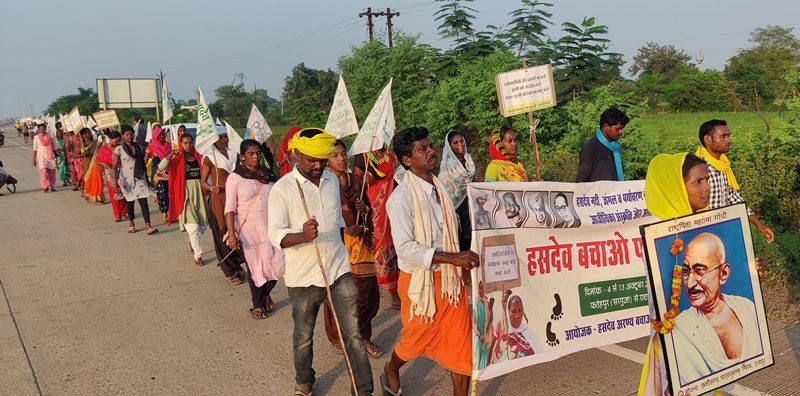Explained: Why are hundreds of tribal villagers marching 300-km to meet the Chhattisgarh Governor
As many as 350 villagers from the districts of Sarguja and Korba have been marching for the past 10 days to reach Chhattisgarh capital Raipur in order to protest against the ‘illegal’ acquisition of coal mines in the Hasdeo Aranya forest area, and press for the implementation of the PESA Act. They wish to meet the Governor Anusuiya Uikey and apprise her of their plea.


The protesting villagers demand that the stipulations of the PESA should be respected. Photo: Alok Shukla/Twitter
Their faces glistening with sweat on a hot and humid day, a column of at least 350 tribal villagers hailing from the districts of Sarguja and Korba dots the road leading to the official residence of the Governor of Chhattisgarh. Having walked more than 300 kilometres in the last ten days, the villagers finally reached Raipur yesterday, eager to meet Anusuiya Uikey, the state Governor. But the wait is yet to be over.
The footmarch commenced from Fatehpur village in Sarguja district’s Ambikapur on October 3. These tribal villagers have been protesting against coal mining in the forest areas for more than a decade but have now resorted to come to the capital and get their voices heard.
On October 13, the villagers reached the state capital Raipur to protest against the acquisition of coal blocks in the Hasdeo Aranya forest area which they deem is illegal occupation and against the consent of their gram sabhas (village council).
Beneath the foliage of the Hasdeo Aranya forest lies one of the biggest reserves of coal in India. As per the estimates of the Indian Bureau of Mines, the reserves amount to 5179.35 million tonnes of coal. The Hasdeo coalfield is spread over an area of 187,960 hectares.
Despite long standing protests by residents and wildlife activists, the Chhattisgarh government in July, approved the auction of 17 coal blocks which also include the coalfields in the Hasdeo Aranya forest. The move has reignited the protests against mining.

As per the Hasdeo Aranya Bachao Sangharsh Samiti, the organisation leading the protests, six coal blocks have been allocated in the area and mining activity has started in two of them — Parsa East and Kete Basan (PEKB) block, and Chotia-I and -II block.
Also Read: Coal Allocation: The full story
‘Implement PESA kanoon’
In the backdrop of slogans like ‘Hasdeo ke coal block nirast karo’ (nullify the allocation of coal blocks in Hasdeo) and ‘Pesa kanoon laagoo karo’ (implement PESA law), 85-year-old Sonairam Paikra said that the rights of the native population in the Hasdeo Aranya area are being threatened and the coming generations will have no place to live and survive if the people living there are displaced in the name of development.
A resident of Gidmudi village in Korba district, Paikra said, “Panchayati Raj system was brought and we were told that we will have a stake in the governance. But now corporations like Adani have been brought in and our voices are being suppressed”.
Also Read: Chhattisgarh govt revives Bodhghat dam project; Bastar’s tribal communities launch strong protests
More than 25 years ago, the Panchayat (Extension to the Scheduled Areas) Act, commonly known as PESA Act, was passed in 1996 to extend the Panchayati Raj system to the tribal areas in the country and recognise the rights of indigenous communities over natural resources.
“Every gram sabha (village council) shall be competent to safeguard and preserve the traditions and customs of the people, their cultural identity, community resources and the customary mode of dispute resolution,” reads the 1996 law.

The protesting villagers demand that the stipulations of the PESA should be respected.
But till now, Chhattisgarh has not been able to formulate rules for its implementation. Apart from the demand of nullifying the allocation of the coal mines, the villagers are also demanding the implementation of the PESA law.
‘Hollow promises’
The implementation of PESA was promised by the Congress party while it campaigned for the assembly elections in 2018.
The framing of rules was initiated by the Congress after coming to power following the elections but the process is yet to be completed, complain activists demanding dismissal of coal blocks allocation in the forest area.
Meanwhile, the notification to allocate the coal mines which was released by the Union Coal Ministry on December 24, 2020 had attracted a total of 470 objection letters. In reply to these objections, Union Coal Minister Pralhad Joshi underlined that the Union government was adhering to the Coal Bearing Areas Acquisition and Development Act, 1957 and in it, there is no provision regarding any consent from gram sabha.
Coal shortage in India?
Interestingly, the protests against mining in Chhattisgarh’s Hasdeo Aranya forest area coincide with the unprecedented ‘shortage’ of coal which is widely reported in the media.
Today, Union Coal Minister Joshi visited the coal mines in Chhattisgarh to oversee the orders to increase the production of coal as 115 out of 135 coal-powered plants in the country face a supply crunch, as reported by the media.
“As far as the requirement is concerned, the power ministry had put forth the demand for supply of 1.9 million tonnes (for power generation units) and after October 20, two million tonnes. Today only, we have supplied two million tonnes and the rest of the things I will discuss after the review (of mines),” Joshi was quoted.
Also Read: Explained: Is coal shortage leading to a ‘power crisis’ in India?

